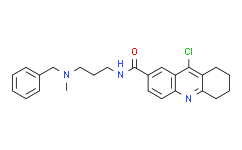| DC72826 |
Usp22i-S02
|
Usp22i-S02(USP22-IN-1, compound S02) is a potent inhibitor of ubiquitin specific peptidase 22 (USP22). It showed anticancer activity by suppressing Foxp3 expression in T-regulatory cells. |
| DC71668 |
Iu1-248
|
Iu1-248, a derivative of IU1, is a potent and selective ubiquitin specific peptidase 14 (USP14) inhibitor with an IC50 of 0.83 μM. |
| DC71045 |
FT709
|
FT709 is a potent and selective USP9X inhibitor, an IC50 of 82 nM. USP9X has been linked with centrosome function, chromosome alignment during mitosis, EGF receptor degradation, chemo-sensitization, and circadian rhythms. |
| DC70873 |
USP10 inhibitor Wu-5
|
USP10 inhibitor Wu-5 (Wu-5) is a novel small molecule USP10 inhibitor inducing the degradation of FLT3-mutated protein, directly interacts and inactivates USP10, the deubiquitinase for FLT3-ITD in vitro (IC50=8.3 uM) and in FLT3-ITD-positive AML cells.Wu-5 selectively inhibited the viability of FLT3 inhibitor-sensitive (MV4-11, Molm13) and -resistant (MV4-11R) FLT3-ITD-positive AML cells with IC50 of 3.794, 5.056, and 8.386 uM, respectively.Wu-5 (1-10 μM) dose-dependently induced apoptosis of MV4-11, Molm13, and MV4-11R cells through the proteasome-mediated degradation of FLT3-ITD.Combined treatment of Wu-5 and crenolanib produced synergistic cell death in FLT3-ITD-positive cells via the reduction of both FLT3 and AMPKα proteins. |
| DC70653 |
NJH-2-075
|
NJH-2-075 is an alkyne-functionalized probe of EN523, retains binding to OTUB1 in vitro. |
| DC70509 |
IMP-1710
|
IMP-1710 (IMP1710) is a potent, selective, covalent UCHL1 inhibitor with IC50 of 38 nM.IMP-1710 demonstrated exquisite selectivity in a cross-screening against 20 DUBs.IMP-1710 can profile activity of endogenous UCHL1 with excellent selectivity in cell types including endothelial cells (EA.hy926) and adenocarcinoma human alveolar basal epithelial cells (A549).IMP-1710 demonstrated >50% fibroblast–myofibroblast transition (FMT) inhibition (IC50=740 nM) in idiopathic pulmonary fibrosis (IPF), as well as αSMA inhibition.IMP-1710 is a powerful and selective probe to explore UCHL1 activity with potential application to substrate identification, mode of action studies, and cellular target profiling. |
| DC70503 |
iBAP-II
|
iBAP-II (BAP1 inhibitor II) is a next-generation, specific small molecule inhibitor of BAP1 histone H2A deubiquitinase activity with IC50 of <0.1 ug/mL.iBAP-II displays higher affinity for BAP1 than the closest UCH family member, UCHL5, and other deubiquitinases, such as USP5, USP7, USP8, TNFAIP3-catalytic domain, USP2-catalytic domain, Otubain-1, and Ataxin3.Inhibition of BAP1 via iBAP-II reduces ASXL3 protein stability in small cell lung cancer cells, without significant changes to ASXL1 and ASXL2 protein levels.iBAP-II suppresses ASCL1 expression in NCI-H1963 cells, along with the mRNA levels involving a handful of known ASCL1 transcriptional targeted genes, such as GRP, DMPK, RNF183, SCN3A, MYCL, and CACNA1A.iBAP-II exhibited more potent cell viability inhibition activity on four different BAP1-WT SCLC cell lines than iBAP.iBAP-II (50 mg/kg/d) significantly delayed the disease progression in SCLC xenograft model. |
| DC11506 |
USP25 and 28 inhibitor AZ-1
|
USP25 and 28 inhibitor AZ-1 (AZ1) is a potent, selective, dual USP25/28 inhibitor with IC50 of 0.7/0.6 uM, respectively; shows a high degree of selectivity over other deubiquitinases (USP4,7 etc.); demonstrates target engagement against both USP25 and USP28 in cells, elicits modulation of both the total levels and the half-life of the c-Myc oncoprotein in cells, and also induces apoptosis and inhibits cell viability in a range of cancer cell lines. |
| DC10917 |
MF-094
|
MF-094 (MF094) is a potent, highly selective inhibitor of ubiquitin specific protease 30 (USP30) with IC50 of 0.12 uM, demonstrates <30% inhibitory activity for a panel of 22 USPs assays at 10 uM. |
| DC10354 |
HBX 19818
|
HBX 19818 is a selective USP7 inhibitor with IC50 of 28.1 uM . |






















